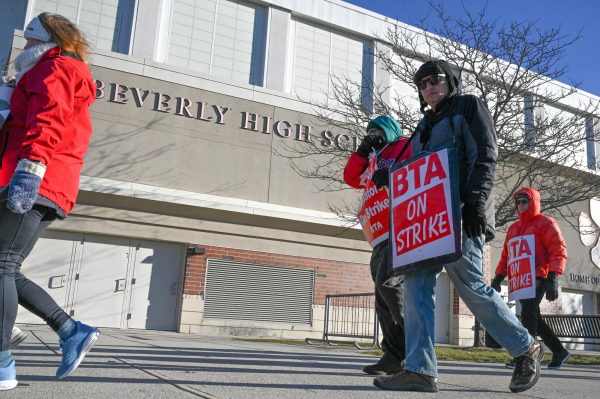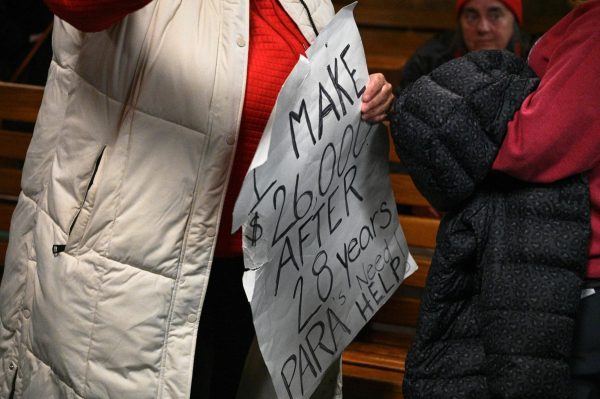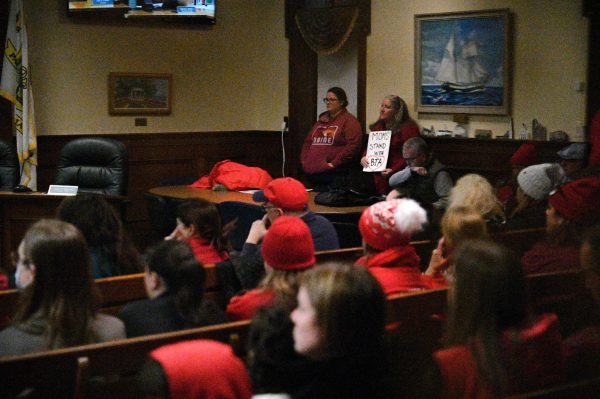The Beverly School Committee President said the 12-day teacher strike was a “planned, coordinated, strategic attack” as high school students streamed into the building last Tuesday.
Students’ return to schools across the district last week marked the end of a strike by the Beverly Teachers Association for increased teacher salaries, living wages for paraprofessionals, and expanded paid parental leave.
Rachael Abell, who is also the district’s primary contract negotiator, said the strike represented a coordinated effort from the Massachusetts Teacher Association “using the parents and children to help further their cause,” and the result of an agenda that she said began over a year prior.
New contracts settled before Thanksgiving, culminating a collective bargaining process of face-to-face negotiation in early 2024 which escalated to court-mandated mediation and later a state-led intervention in what became the longest teacher strike in modern state history.
Abell said the BTA’s goal post-shifting caused the strike and prolonged the settlement, which only benefited the teachers.
“It just was about wages … it wasn’t about the kids,” Abell said.
However, many local community members painted a very different picture, both of the strike and Abell herself.
She has been on the receiving end of online criticism and accusations of dishonesty and a proposed recall petition along with city mayor Michael Cahill to remove her from her office, as educators expressed disapproval with the handling of negotiations.
Andrea Sherman, co-president of the Beverly Teachers Association, which represents district teachers and paraprofessionals, said the school committee was negotiating in bad faith and “stalling on purpose in an attempt to break the union,” leading to the need for a strike.

Sherman suspected “ideological reasons” lay behind negotiations continuing for so long, which she believes the district had the money to settle from day one.
Abell said these proposals were unattainable due to complex fiscal and compliance constraints. She also said such representations were indicative of oversimplifications of the bargaining process by the teachers union, which, coupled with “an agenda” set by the state teacher union, created a “mob mentality” throughout Beverly and the wider community.
Abell, who has two kids at the high school, said she was surprised by the actions of some of her own kids’ teachers throughout the strike. She said she also noticed her friends signing off on her recall.
“That shocked me,” Abell said. “I think people were confused what they were signing.”
Abell recollected one evening during an executive session at McKeown School where she said participants in a rally outside “were beating the building with lead pipes, banging on drums, and drinking alcohol on school property,” all while kids were present.
Calling it a “scare tactic,” Abell said it was the only time during the strike where she felt unsafe, but added the action may have mobilized individuals from outside Beverly. The School Committee members received police details during the strike.
Beverly teachers union representatives said they had no knowledge of the alleged incident and denied it happened.
In a post from the same date, the BTA claimed that “management attempted to block entry” to the school.
Both sides agreed the proposals were not dissimilar enough to justify the prolonged strike, though their reasons for the delay differed.
Abell said some requests couldn’t be accommodated because of the nature of employee-employer contracts, and other financial settlements differed only marginally from outstanding proposals made during the summer.
“There were a lot of hot-button issues that people were holding signs and making chants [for], and those aren’t the things that go into a contract,” Abell said, referencing the community galvanization over class sizes and lunch and recess provisions.

In neighboring Danvers, the latest teacher contract did include language for maximum class size limits and recess and lunch requirements for elementary schools.
In an address to the City Council earlier this month, Cahill said the final settlement only cost $60,000 more than an August offer. He also insisted that non-salaried issues could have been bargained while schools re-opened.
“That’s an insignificant amount of money for a city budget to keep schools closed for as long as he did,” Sherman said in response, adding the BTA felt a strike was necessary until a fair return-to-work agreement was signed to ensure members were protected.
This earlier offer left out crucial concerns like paid leave and paraprofessional wages, which the association felt were important to take a stand on, Sherman said.
Abell said the insistence on striking was part of an agenda set by the state union, whose representatives she said “led the negotiations,” and who were “really about theatrics and not making progress.”
She added the union’s incorporation into North Shore Educators United, an organization including members from Marblehead and Gloucester—whose unions struck the same week as Beverly—signaled their alignment with the “MTA playbook,” and intention to try and shield themselves from coercive fines.
Strike actions are illegal for public employees in Massachusetts, and over $500,000 in fines were imposed against the Beverly Teachers Association during the strike. The union said it does not have the money to pay them off.
“There’s no benefit personally to the MTA to going on strike,” Sherman said. “Their role is to help a local union earn a fair contract.” Additionally, despite their incorporations, the BTA made fine payments to the court throughout the strike until they lacked the funds to do so.
The MTA represents the majority of districts in the state, including the three North Shore districts on strike in November, and has a history of lobbying for the legalization of teacher strikes. Some have raised concerns that strike actions coordinated on a larger scale would cause harm to student education in service to larger agendas that are not reflective of local problems.
The MTA did not respond to a request for comment on their involvement in the strikes.
Abell said court-mandated mediation often included draining 12–16 hour days at the bargaining table.
She also expressed sympathy for the effect the continued closure of schools had on the community, especially as a stalemate induced the state-mandated “fact-finding” process, and the school committee leaving bargaining as an independent investigation began.
“When we saw no progress day after day, we knew that we had to do something different,” Abell said.
Union members refused to participate in the process due to its nonbinding nature.
“I’m outraged,” Pável Uranga, a parent of a 7th-grader, said during a rally on Nov. 25 as the School Committee continued its refusal to negotiate. “As the citizens of Beverly we pay taxes, we have the right to be [at the bargaining table].”

Jennifer Snow, a parent and former lunch monitor, expressed frustration at the school committee and having to take time off to stay home with her daughter.
“They’re punishing the BTA for striking,” Snow said, adding potential losses in learning caused by the strike could be “COVID all over again.”
Sherman said changes to the education landscape post-COVID made this—the first major contract since pandemic closures—especially important and fraught.
The next evening, a deal would finally be reached in a last-minute return to bargaining, but the future for both parties remains less settled.
“I will not resign. I’m committed to the kids,” Abell said.
Outstanding fines also remain unpaid by the union, though Sherman said the union has not received word on the future of these obligations.
“I think everyone is just really grateful to be back to normal routines … and to not be standing out in the cold anymore,” Joanna Seeber, another union bargaining member, said.